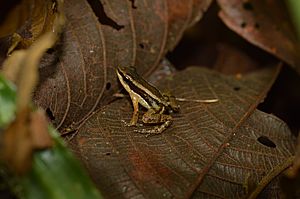Allobates insperatus facts for kids
Quick facts for kids Allobates insperatus |
|
|---|---|
 |
|
| Conservation status | |
| Scientific classification | |
| Synonyms | |
|
Colostethus insperatus Morales, 2000 |
The Santa Cecilia Rocket Frog (Allobates insperatus) is a small frog that belongs to the Aromobatidae family. It was first described in 2000. This frog is special because it is endemic to a specific area. This means it is only found naturally in the Amazonian slopes of eastern Ecuador.
Sometimes, its home range stretches close to the Colombian border. This suggests that it might also live in Colombia.
Contents
Where Does the Santa Cecilia Rocket Frog Live?
The Santa Cecilia Rocket Frog makes its home in the leaf-litter of forests. This is the layer of fallen leaves and twigs on the forest floor. It's a great hiding spot!
How Do These Frogs Have Babies?
These frogs are unique in how they raise their young. They lay their eggs in small, temporary puddles. These puddles often form in the bracts of palms. Bracts are like special leaves that grow near flowers or fruit on palm trees.
The puddles are called ephemeral pools. This means they only last for a short time, like after it rains.
What Threats Do These Frogs Face?
Sadly, the places where these frogs live are shrinking. Their forest homes are threatened by human activities.
- Farming: Land is cleared for farms and crops.
- Logging: Trees are cut down for wood.
- Oil exploration: Companies look for oil, which can disturb the land.
These activities destroy the forest and the small pools where the frogs breed. Protecting these forests helps protect the Santa Cecilia Rocket Frog.
See also
 In Spanish: Rana saltarina de Santa Cecilia para niños
In Spanish: Rana saltarina de Santa Cecilia para niños


